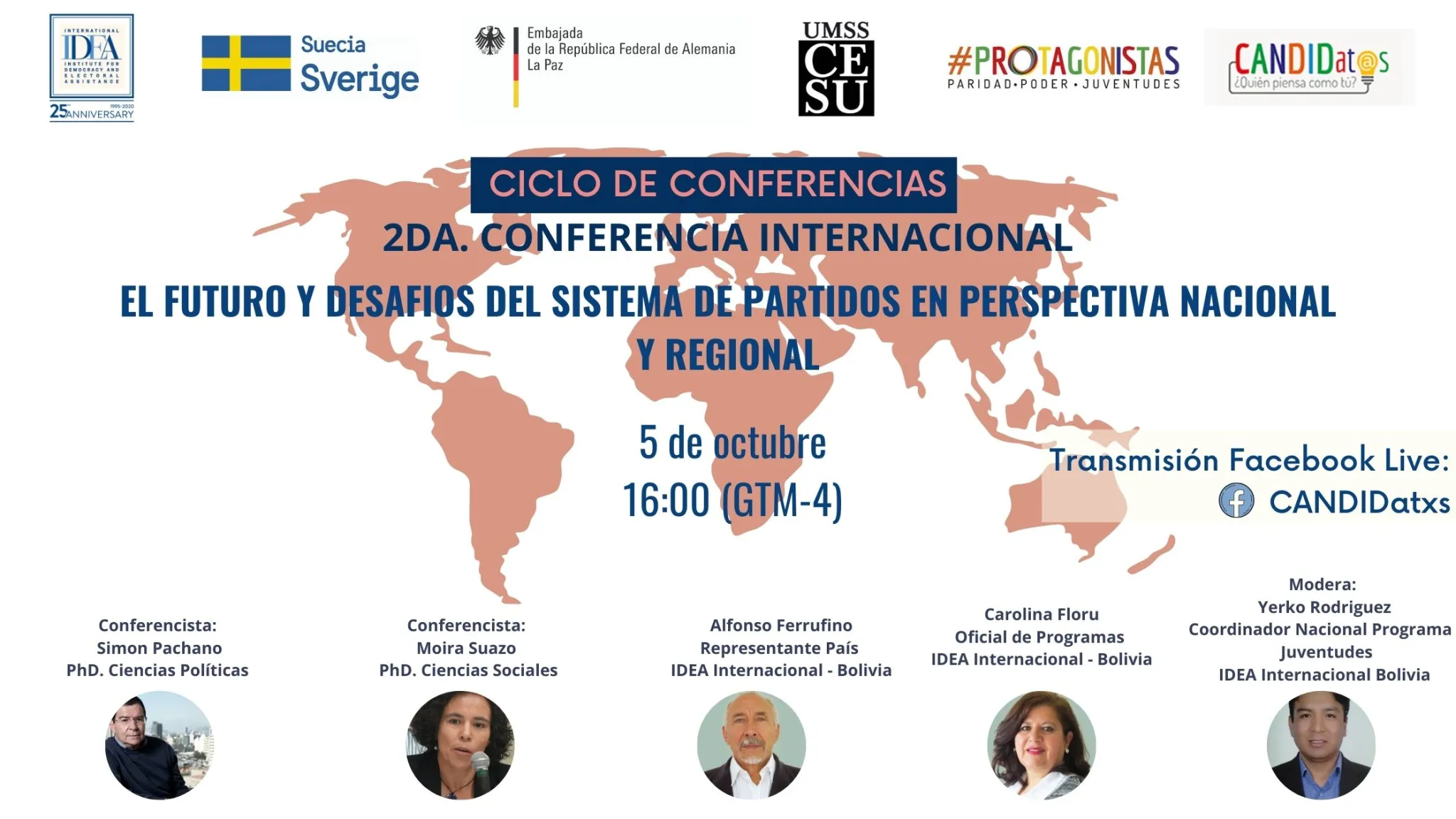Conference: The Future and Challenges of Political Party Systems

Within the framework of a series of international conferences, in commemoration of 25 years of the work carried out by the International Institute for Democracy and Electoral Assistance (International IDEA), a second such conference was held to analyze the future and challenges of the Bolivian governmental system of representation and those in the wider Latin American region, where it has become evident to society that there is a latent deterioration of the reputation of systems of political representation, accentuated by the COVID-19 pandemic, which has shone the spotlight on a number of risks and challenges faced by public authorities and governments.
Este artículo está disponible en español.
For Alfonso Ferrufino, International IDEA’s Senior Adviser in Bolivia, it is the very youth, as well as future generations, who will be in charge of the profound changes and qualitative renewal that the region may experience in the coming years. Its main challenge lies in transforming the structure and behavior of political parties, beyond other forms of representation and citizen action directed to the state, in order to achieve a constructive convergence of articulation, representation and the exercise of public powers.
A speaker at the event, Moira Zuazo, a Bolivian political scientist, who holds a PhD in social sciences, provided a broad explanatory analysis from a sociological standpoint, noting that when we refer to the political party system, we are addressing the potential interaction between different political parties, and that within the Bolivian party system, such a means of communicating with one another has not been effective, nor has any dialogue been generated with regard to society as a whole. Furthermore, she proposes that the current three-legged stool multi-party system although complex, tends to an equilibrium of sorts as defined by: a) a large nationwide party, not very open to dialogue, b) a medium-sized party, with some nationwide coverage, open to dialogue, and c) a medium-sized, regional-based party, somewhat open to dialogue.
The first challenge to the system in the region is to restore confidence in politics, and this begins with the actions of politicians at a grassroot level, which obviously will have a public and political effect on Bolivian democracy.
Dr Zuazo also argues that the functions and roles of political parties are essential to this; functions in the governmental and electoral arenas, which are driven by different logics. The political synthesis is the first role to be placed in the arenas, through a diversity filled dialogue; a second role being the recruitment and selection of political operatives, capable of providing a satisfactory response and achieving society’s expectations when governing. A third role is when candidates being put forward by a party, mirror society itself; the fourth role is structuring the political struggle along spaces of open dialogue with society; and finally there is the role of coordination, addressing internal division within a party, such that there is not just one voice, but many from within the party base itself.
From a more institutional perspective, another speaker Simón Pachano, who holds a PhD in Political Science, highlighted the significance of having the right conditions for political parties, and to this end the existence of a democratic regime is essential.
Within this environment there is a need for stability in party rules, as well rules governing parties as a whole, which not only are applied during the election, but also are solid in terms of ideology, and provide society with a valid government programme. These must be independent of pressure groups and be rooted in society itself. Such that elections are always conceived from a legal and legitimate standpoint as the only possible way to arrive at a seat in government. All these elements are required to institutionalize the political party system, its structure and the dynamics of competitiveness.
In Latin America, however, the crises afflicting political parties has been caused by the following factors: a decline in the rule of law; irregularities during the elections; deficiencies in checks and balances; no accountability checks on politicians; scarcity of citizen control; constant and unforeseen changes to regulations and party rules; slackness in qualifying requirements and electoral manipulation.
Taking into account all these elements, Dr Pachano, projects the degree of institutionalization of countries in the region, noting that Bolivia falls under a group of unstable regimes, along with most countries in Latin America, and only just avoids descending among those that only exhibit non-compliances in all their dimensions. Adding that Costa Rica and Uruguay are among the most exemplary countries in institutional terms, having reached a level of consolidation, thanks to solid and stable competitiveness, that is both dynamic and reliable.
During the closure of the event, Ms Carolina Floru, International IDEA’s Programme Officer, highlighted the initiative undertaken by the institute in setting in motion the integration process, which engages youth as the transformative generation within the political establishment, noting the ongoing training provided through the Diploma in Parliamentary Governance, and anticipated that in the near future we will be witnessing the participation of young people and the reform of the political party system.




